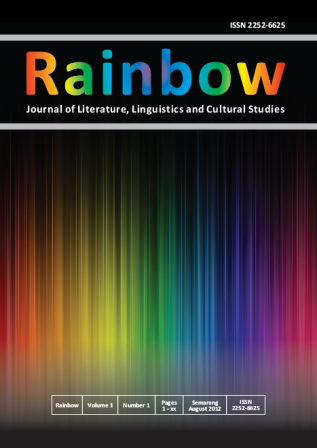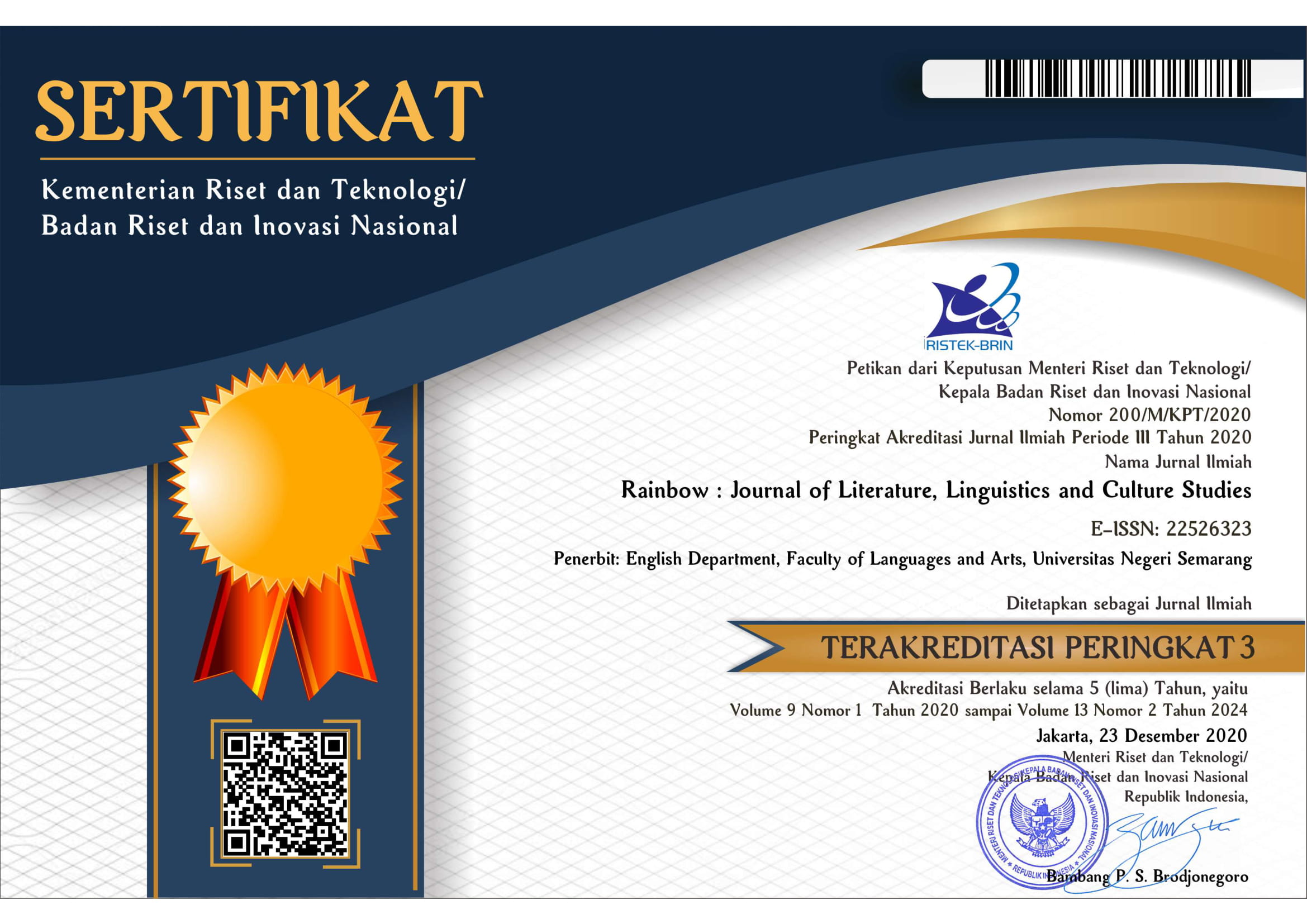ESCAPISM AS A MANIFESTATION OF UNFULFILLED DREAMS IN CARL SANDBURG’S POEMS DREAM IN THE DUSK AND WAITING
Abstract
This final project is about Escapism. The objectives of this study are to analyze dreams that are not fulfilled in the poems, to analyze how the poem reveals the poet’s escapism through poetic devices such as imagery and figures of speech and to describe how escapism as a manifestation of unfulfilled dreams in the poems viewed from Freud’s theory.
The psychological approach used in analysing these poems is Freud’s psychoanalysis. The researcher analyzes the case of escapism as a manifestation of unfulfilled dreams in the poems. Qualitative method is used in this study, while library and other references are used here to get data. The data are focused on words, stanzas, imagery and figures of speech in the poems. Then the researcher starts to analyze and finally report the answer of statements of the problem.
There were some results discovered in this study. First, in Dream in the Dusk, the poet dreams to be a rich person and in Waiting, the poet dreams of his home. Second, the poems reveal the poet’s escapism as a manifestation of unfulfilled dreams through poetic devices such as imagery and figures of speech. It has the poet’s message and figures of speech which show escapism in the poems. At last, escapism as a manifestation of unfulfilled dreams viewed from Freud’s psychoanalysis shows that escapism found in this poem is fantasy of the poet that makes him feel better, and it can also make him forget the distressed feelings caused by reality.
The final conclusion of the study is that the poet cannot reach his dreams. It makes him sad and despair, so, he escapes from his sadness by fantasizing.
References
Asiado, Tel. 2009. Carl Sandburg Biography: American Poet and Biographer of Lincoln, Pulitzer Prize Winner.
http://suite101.com/article/carl-sandburg-poems-and-biographies-a92402Downloaded on 4 September 2012
Baym, Nina. 1999. The Norton Anthology of American Literature. New York: W. Norton & Company.
Boeree, C. George. 2000. Freud and Psychoanalysis.
http://webspace.ship.edu/cgboer/psychoanalysis.html
Downloaded on 24 March 2012
Bradshaw, Robert I. 1997. Figures of Speech.
http://www.biblicalstudies.org.uk/article_idioms.html
downloaded on 24 June 2012
Bressler, Charles E. 1994. Literary Criticism: An Introduction to Theory and Practice. Upper Saddler River, New Jersey: Houghton College Prentice Hall.
Cherry, Kendra. 2012. The Id, Ego, and Superego: The Structural Model of Personality.
http://psychology.about.com/od/theoriesofpersonality/a/personalityelem.htm
Downloaded on 10 April 2012
DeLisle, Harold. Parker, Robert. Ridlon, Harold. Yokelson, Joseph. 1971. The Personal Response To Literature. Boston: Houghton Mifflin Company.
Endraswara, Suwardi. 2008. Metode Penelitian Psikologi Sastra. Yogyakarta: Media Pressindo. http://contemporarylit.about.com/cs/literaryterms/g/poetry.htm Downloaded on 3 March 2012
Fournier, Gillian. 2010. Reality Principle.http://psychcentral.com/encyclopedia/2009/reality-principle Downloaded on 5 June 2012
Frederik, Juliana Tirajoh. 1988. English Poetry: An Introduction to Indonesian Students. Jakarta: Departemen Pendidikan dan Kebudayaan.
Haryanti, Rahayu Puji. 2007. Introduction To Literary Studies. English Department, Faculty of Languages and Arts. Semarang State University.
Holzman, Philip. S. 1970. Psychoanalysis and Psychopathology. New York: McGraw Hill Inc.
Johnson, J. 2012. Escapism Psychology - Mental Retreat From Reality. http://www.searchquotes.com/viewimage/Escapism_Psychology_-_Mental_Retreat_From_Reality/152/downloaded on 29 April 2012
McDuffee, Harry. 2011. Escapism Psychology: Finding Your Twilight Zone And Getting Far - Far Away Escapism Psychology. http://www.claimyoursnow.com/self-help/escapism-psychology-finding-your-twilight-zone-and-getting-far-far-away-escapism-psychology/downloaded on 29 April 2012
Millon, Thodore. Everly jr, George. S. 1985. Personality And Its Disorders: A Biosocial Learning Approach. John Wiley & Sons.
Moghaddam, Fathali M. 2009. From Psychology in Literature to Psychology is Literature: An Exploration of Boundaries and Relationships http://www.sagepublications.com Downloaded on 29 February 2012
Mujiyanto, Yan. 2009. Petunjuk Penulisan Skripsi. Jurusan Bahasa Inggris, Fakultas Bahasa dan Seni, Universitas Negeri Semarang.
Niven, Penelope. 1991. Carl Sandburg: A Biography. New York: Maxwell Maxmillian International.
Nordquist, Richard. 2012. Top 20 Figures of Speech. http://grammar.about.com/od/rhetoricstyle/a/20figures.htm Downloaded on 3 March 2012
Perrine, Laurence and Arp, Thomas R. 1991. Sound and Sense: An Introduction to Poetry. Orlando, Florida: Harcourt Brace & Company.
Pervin, A. Laurence. 1984. Personality: Theory and Research, Fourth Edition. New York: John Wiley & Sons, Inc.
Rees, R. J. 1973. English Literature: An Introduction for Foreign Readers. London: Macmillan Education Limited.
Sandburg, Carl. 1992. Selected Poems Of Carl Sandburg. Random House Value Publishing Inc.
Scott, Veronica. 2007. What is Escapism? http://EzineArticles.com/?expert=Veronica_Scott Downloaded on 29 April 2012
Stobaugh, James P. 2002. American Literature, Teachers Edition (Encouraging Thoughtful Christians to be World Changers). For Such A Time As This Ministries.
Zabel, Vivian Gilbert. 2005. Poetic Devices in Poetry. http://EzineArticles.com/?expert=Vivian_Gilbert_Zabel Downloaded on 30 April 2012







